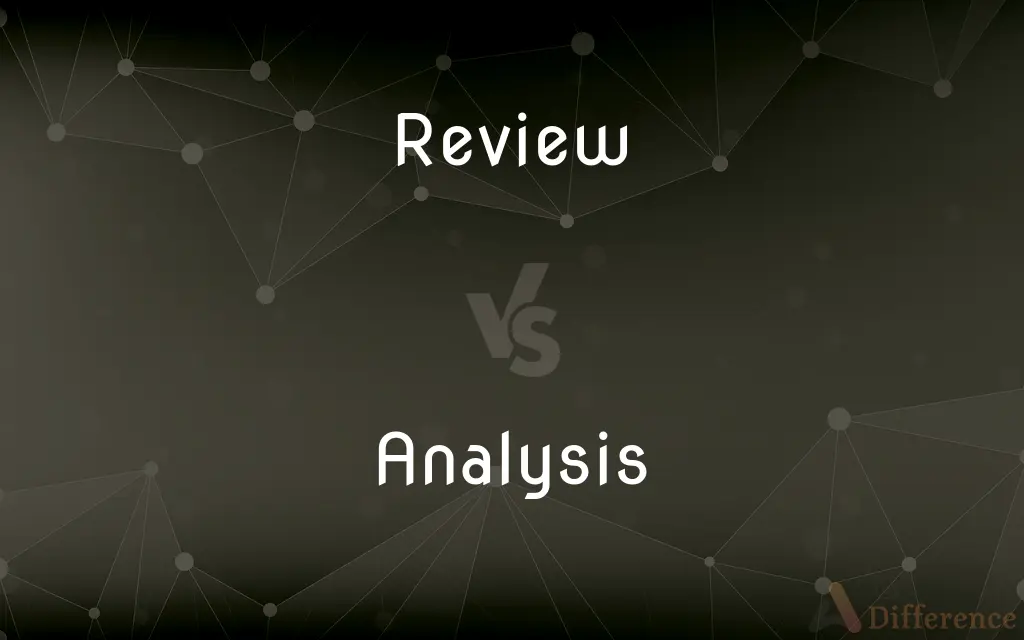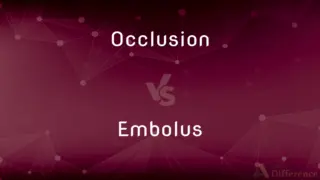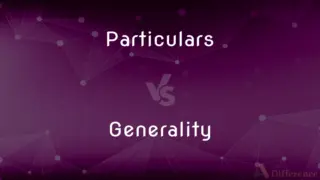Review vs. Analysis — What's the Difference?
By Tayyaba Rehman — Updated on October 5, 2023
A review gives an opinion or evaluation, while an analysis breaks down a topic or concept to understand its components.

Difference Between Review and Analysis
Table of Contents
ADVERTISEMENT
Key Differences
In the realm of critical thinking, both review and analysis hold significant value. A review primarily offers an assessment or opinion on a subject. This may be based on personal taste, experience, or other criteria. On the other hand, analysis delves deeper, attempting to unpack and understand the subject's components, reasons, or underlying themes.
Review, often seen in literary or product contexts, provides feedback, recommendations, or commentary. For instance, a book review might discuss the narrative's pacing or a character's development. In contrast, an analysis of the same book would dissect its themes, motifs, or the author's choice of literary devices.
Review serves to inform others of the overall quality or worth of something, potentially guiding decisions. If you read a movie review, it could influence your choice to watch it. Analysis, conversely, educates by providing in-depth insight. Analyzing the same movie would entail discussing its cinematography, character arcs, and maybe even cultural implications.
In professional contexts, to review a document means to check its quality, completeness, and adherence to standards. An analysis, in this sense, would mean dissecting its content, understanding its implications, and perhaps predicting its impact.
Review is often more subjective, colored by the reviewer's personal opinions and biases. Analysis, while it can have subjective elements, leans more on objective scrutiny, seeking to uncover deeper truths or facts about the subject in question.
ADVERTISEMENT
Comparison Chart
Nature
Subjective opinion or evaluation
Objective breakdown of components
Purpose
Inform or guide decisions based on personal assessment
Understand in-depth or derive deeper insights
Depth
Generally high-level
Detailed and comprehensive
Common Contexts
Product evaluations, book critiques, movie feedback
Academic research, business reports, studies
Outcome
Recommendation, rating, or feedback
Understanding, interpretation, or prediction
Compare with Definitions
Review
A critique or evaluation of a work.
After reading the novel, she wrote a glowing review praising the author.
Analysis
The process of breaking a complex topic into smaller parts to gain a better understanding.
The scientist's analysis of the data led to a groundbreaking discovery.
Review
A formal assessment or examination of something.
The company conducts a quarterly review of its sales strategies.
Analysis
The examination of something in detail to understand its nature or determine its essential features.
Her analysis of the poem revealed several layers of meaning.
Review
A retrospective look or reconsideration of past events.
Upon review, he realized he had made several errors.
Analysis
A detailed report or commentary explaining the nature or interpretation of a given topic.
The newspaper published an in-depth analysis of the election results.
Review
A ceremonial display of military troops.
The president attended the annual military review.
Analysis
The mathematical study of functions, sequences, and series.
In his mathematics course, he struggled with real analysis.
Review
A revision or study of material previously learned.
Before the final exam, students had a review session.
Analysis
Analysis is the process of breaking a complex topic or substance into smaller parts in order to gain a better understanding of it. The technique has been applied in the study of mathematics and logic since before Aristotle (384–322 B.C.), though analysis as a formal concept is a relatively recent development.The word comes from the Ancient Greek ἀνάλυσις (analysis, "a breaking-up" or "an untying;" from ana- "up, throughout" and lysis "a loosening").
Review
A review is an evaluation of a publication, service, or company such as a movie (a movie review), video game (video game review), musical composition (music review of a composition or recording), book (book review); a piece of hardware like a car, home appliance, or computer; or softwares such as business software, sales softwares; or an event or performance, such as a live music concert, play, musical theater show, dance show or art exhibition. In addition to a critical evaluation, the review's author may assign the work a rating to indicate its relative merit.
Analysis
Detailed examination of the elements or structure of something
Statistical analysis
An analysis of popular culture
Review
To look over, study, or examine again
Reviewed last week's lesson.
Analysis
Short for psychoanalysis
Other schools of analysis have evolved out of the original disciplines established by Freud
Review
To consider retrospectively; look back on
Reviewed the day's events.
Analysis
The separation of an intellectual or material whole into its constituent parts for individual study.
Review
To examine with an eye to criticism or correction
Reviewed the research findings.
Analysis
The study of such constituent parts and their interrelationships in making up a whole.
Review
To write or give a critical report on (a new work or performance, for example).
Analysis
A spoken or written presentation of such study
Published an analysis of poetic meter.
Review
(Law) To evaluate (a decision made by or action taken by a lower court) to determine whether any error was made.
Analysis
The separation of a substance into its constituent elements to determine either their nature (qualitative analysis) or their proportions (quantitative analysis).
Review
To subject to a formal inspection, especially a military inspection.
Analysis
The stated findings of such a separation or determination.
Review
To go over or restudy material
Reviewing for a final exam.
Analysis
A branch of mathematics principally involving differential and integral calculus, sequences, and series and concerned with limits and convergence.
Review
To write critical reviews, especially for a newspaper or magazine.
Analysis
The method of proof in which a known truth is sought as a consequence of a series of deductions from that which is the thing to be proved.
Review
A reexamination or reconsideration.
Analysis
(Linguistics) The use of function words such as prepositions, pronouns, or auxiliary verbs instead of inflectional endings to express a grammatical relationship; for example, the cover of the dictionary instead of the dictionary's cover.
Review
A retrospective view or survey.
Analysis
Psychoanalysis.
Review
A restudying of subject matter.
Analysis
Systems analysis.
Review
An exercise for use in restudying material.
Analysis
(countable) Decomposition into components in order to study (a complex thing, concept, theory etc.).
Review
A report or essay giving a critical estimate of a work or performance.
Analysis
(countable) The result of such a process.
Review
A periodical devoted to articles and essays on current affairs, literature, or art.
Analysis
The mathematical study of functions, sequences, series, limits, derivatives and integrals.
Mathematical analysis
Review
An inspection or examination for the purpose of evaluation.
Analysis
Proof by deduction from known truths.
Review
A formal military inspection.
Analysis
The process of breaking down a substance into its constituent parts, or the result of this process.
Review
A formal military ceremony held in honor of a person or occasion.
Analysis
The analytical study of melodies, harmonies, sequences, repetitions, variations, quotations, juxtapositions, and surprises.
Review
(Law) An evaluation conducted by a higher court of a decision made or action taken by a lower court to determine whether any error was made.
Analysis
Psychoanalysis.
Review
A musical show consisting of often satirical skits, songs, and dances; a revue.
Analysis
A resolution of anything, whether an object of the senses or of the intellect, into its constituent or original elements; an examination of the component parts of a subject, each separately, as the words which compose a sentence, the tones of a tune, or the simple propositions which enter into an argument. It is opposed to synthesis.
Review
A second or subsequent reading of a text or artifact in an attempt to gain new insights.
I need to make a review of the book before I can understand it.
Analysis
The separation of a compound substance, by chemical processes, into its constituents, with a view to ascertain either (a) what elements it contains, or (b) how much of each element is present. The former is called qualitative, and the latter quantitative analysis.
Review
An account intended as a critical evaluation of a text or a piece of work.
The newspaper review was full of praise for the play.
Analysis
The tracing of things to their source, and the resolving of knowledge into its original principles.
Review
(legal) A judicial reassessment of a case or an event.
The victims demanded a full judicial review of the case.
Analysis
The resolving of problems by reducing the conditions that are in them to equations.
Review
A stage show made up of topical sketches etc.
The Cambridge Footlights Review launched many Monty Python faces.
Analysis
A syllabus, or table of the principal heads of a discourse, disposed in their natural order.
Review
A survey of the available items or material.
The magazine contained a review of Paris restaurants.
Analysis
The process of ascertaining the name of a species, or its place in a system of classification, by means of an analytical table or key.
Review
A periodical which makes a survey of the arts or some other field.
The Times Literary Review is published in London.
Analysis
An investigation of the component parts of a whole and their relations in making up the whole
Review
A military inspection or display for the benefit of superiors or VIPs.
The troops assembled for a review by the Queen.
Analysis
The abstract separation of a whole into its constituent parts in order to study the parts and their relations
Review
A forensic inspection to assess compliance with regulations or some code.
The regulators demanded a review against NYSE practices.
Analysis
A form of literary criticism in which the structure of a piece of writing is analyzed
Review
To survey; to look broadly over.
Before I tackle the question directly, I must briefly review historical approaches to the problem.
Analysis
The use of closed-class words instead of inflections: e.g., `the father of the bride' instead of `the bride's father'
Review
To write a critical evaluation of a new art work etc.; to write a review.
The critic reviews every new play in London.
Analysis
A branch of mathematics involving calculus and the theory of limits; sequences and series and integration and differentiation
Review
To look back over in order to correct or edit; to revise.
Analysis
A set of techniques for exploring underlying motives and a method of treating various mental disorders; based on the theories of Sigmund Freud;
His physician recommended psychoanalysis
Review
To look over again (something previously written or learned), especially in preparation for an examination.
Analysis
The separation of a whole into its components for individual study.
The rock was sent to the lab for analysis to determine its mineral content.
Review
(obsolete) To view or see again; to look back on.
Review
(obsolete) To retrace; to go over again.
Review
To view or see again; to look back on.
Review
To go over and examine critically or deliberately.
Review
To retrace; to go over again.
Shall I the long, laborious scene review?
Review
To look back; to make a review.
Review
A second or repeated view; a reëxamination; a retrospective survey; a looking over again; as, a review of one's studies; a review of life.
Review
An examination with a view to amendment or improvement; revision; as, an author's review of his works.
Review
A critical examination of a publication, with remarks; a criticism; a critique.
Review
A periodical containing critical essays upon matters of interest, as new productions in literature, art, etc.
Review
An inspection, as of troops under arms or of a naval force, by a high officer, for the purpose of ascertaining the state of discipline, equipments, etc.
Review
The judicial examination of the proceedings of a lower court by a higher.
Review
A lesson studied or recited for a second time.
Review
A new appraisal or evaluation
Review
An essay or article that gives a critical evaluation (as of a book or play)
Review
A subsequent examination of a patient for the purpose of monitoring earlier treatment
Review
(accounting) a service (less exhaustive than an audit) that provides some assurance to interested parties as to the reliability of financial data
Review
A variety show with topical sketches and songs and dancing and comedians
Review
A periodical that publishes critical essays on current affairs or literature or art
Review
A summary at the end that repeats the substance of a longer discussion
Review
(law) a judicial reexamination of the proceedings of a court (especially by an appellate court)
Review
Practice intended to polish performance or refresh the memory
Review
A formal or official examination;
The platoon stood ready for review
We had to wait for the inspection before we could use the elevator
Review
Look at again; examine again;
Let's review your situation
Review
Appraise critically;
She reviews books for the New York Times
Please critique this performance
Review
Hold a review (of troops)
Review
Refresh one's memory;
I reviewed the material before the test
Review
Look back upon (a period of time, sequence of events, etc.); remember;
She reviewed her achievements with pride
Common Curiosities
What is a review primarily used for?
A review is primarily used to offer an assessment or opinion on a subject.
What is the main focus of an analysis?
The main focus of an analysis is to break down a topic or concept to understand its components.
Can a review be objective?
While reviews often contain subjective opinions, they can aim for objectivity, especially in professional contexts.
Is analysis always objective?
Analysis leans toward objectivity but can contain subjective elements, especially in interpretive analyses.
Can a document or work have both a review and an analysis?
Yes, a work can be both reviewed (evaluated) and analyzed (broken down for deeper understanding).
In what contexts is analysis commonly used?
Analysis is commonly used in academic research, business reports, and scientific studies.
Is a review longer than an analysis?
Length isn't definitive. A review can be brief or extensive, as can an analysis; it depends on the depth and detail required.
How is a review different from a summary?
A review provides an evaluation or opinion, while a summary offers a concise recap without personal judgment.
Can anyone write a review?
Yes, anyone can write a review based on their personal experience or opinion about a subject.
Share Your Discovery

Previous Comparison
Occlusion vs. Embolus
Next Comparison
Particulars vs. GeneralityAuthor Spotlight
Written by
Tayyaba RehmanTayyaba Rehman is a distinguished writer, currently serving as a primary contributor to askdifference.com. As a researcher in semantics and etymology, Tayyaba's passion for the complexity of languages and their distinctions has found a perfect home on the platform. Tayyaba delves into the intricacies of language, distinguishing between commonly confused words and phrases, thereby providing clarity for readers worldwide.















































